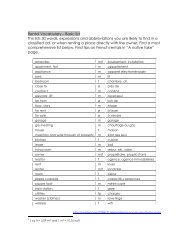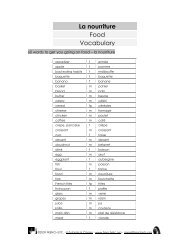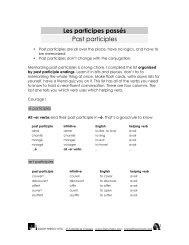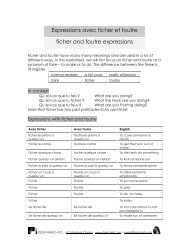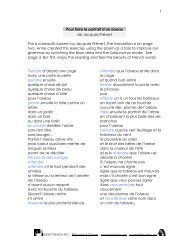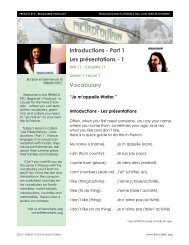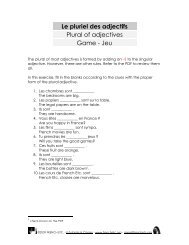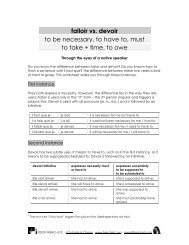grammar premium's worksheet on reflexive verbs - French Etc
grammar premium's worksheet on reflexive verbs - French Etc
grammar premium's worksheet on reflexive verbs - French Etc
Create successful ePaper yourself
Turn your PDF publications into a flip-book with our unique Google optimized e-Paper software.
Les verbes pr<strong>on</strong>ominaux<br />
<strong>French</strong> <strong>reflexive</strong> <strong>verbs</strong><br />
Grammar<br />
Ça s’appelle un chou frisé.<br />
It’s called a Savoy cabbage.<br />
Lots of <strong>French</strong> <strong>verbs</strong> have a SE – or S’ – in fr<strong>on</strong>t of them. I like to call them<br />
‘SE-<strong>verbs</strong>’. In English though, they’re called ‘<strong>reflexive</strong> <strong>verbs</strong>’. For instance,<br />
you’ll hear that ‘SE PROMENER', 'S'APPELER' or 'S’AMUSER' are <strong>reflexive</strong><br />
<strong>verbs</strong>. However, to be more accurate, we should call these <strong>verbs</strong><br />
‘pr<strong>on</strong>ominal’ <strong>verbs</strong>. One more thing: a <strong>French</strong> verb can go from <strong>on</strong>e<br />
category to another.<br />
neutral appeler to call J’appelle m<strong>on</strong> avocat.<br />
<strong>reflexive</strong> s’appeler to be named Je m’appelle Anne.<br />
reciprocal s’appeler to call some<strong>on</strong>e J’appelle Henri. Je l’appelle.<br />
pr<strong>on</strong>ominal passive s’appeler to be called Ça s’appelle un chou frisé.<br />
Pr<strong>on</strong>ominal <strong>verbs</strong> can be threefold.<br />
<strong>reflexive</strong> <strong>reflexive</strong> verb – les verbes réfléchis<br />
reciprocal reciprocal verb – les verbes réciproques<br />
passive passive verb – les verbes passifs<br />
©2009 FRENCH ETC. - E-Tutorials & Classes - www.frenchetc.org - anne@frenchetc.org
Let’s see how this works.<br />
They are <strong>reflexive</strong> when the acti<strong>on</strong> of the verb is d<strong>on</strong>e <strong>on</strong>to itself.<br />
il se regarde dans le miroir<br />
he looks at himself in the mirror<br />
Il s’appelle M. Dup<strong>on</strong>t.<br />
His name is Mr. Dup<strong>on</strong>t.<br />
They are reciprocal when the acti<strong>on</strong> of the verb is d<strong>on</strong>e <strong>on</strong>to <strong>on</strong>e<br />
another.<br />
elle nous réveille<br />
she wakes us up<br />
Elle nous appelle le dimanche toutes les semaines.<br />
She calls us <strong>on</strong> Sunday every week.<br />
They are passive pr<strong>on</strong>ominal when the subject of the sentence undergoes<br />
the acti<strong>on</strong>, and is not doing the acti<strong>on</strong> itself.<br />
le français se parle<br />
<strong>French</strong> is spoken<br />
Ça s’appelle un chou frisé.<br />
It’s called a Savoy cabbage.<br />
*****************<br />
‘SE-<strong>verbs</strong>’ all use a pr<strong>on</strong>oun that can be <strong>reflexive</strong>, reciprocal or passive.<br />
• Use a <strong>reflexive</strong> pr<strong>on</strong>oun when the acti<strong>on</strong> is d<strong>on</strong>e <strong>on</strong>to itself<br />
je me lève I’m getting up<br />
I to myself am getting up<br />
il se lève he’s getting up<br />
he to himself is getting up<br />
Reflexive pr<strong>on</strong>ouns work the following way<br />
pers<strong>on</strong>al<br />
pr<strong>on</strong>oun<br />
<strong>reflexive</strong><br />
pr<strong>on</strong>oun verb<br />
je me/m’ 1 verb<br />
tu te/t’ verb<br />
elle se/s’ verb<br />
il se/s’ verb<br />
<strong>on</strong> se/s’ verb<br />
nous nous verb<br />
vous vous verb<br />
ils se/s’ verb<br />
elles se/s’ verb<br />
1 use m’ when the following verb starts with a vowel: s’amuser<br />
©2009 FRENCH ETC. - E-Tutorials & Classes - www.frenchetc.org - anne@frenchetc.org
Practice<br />
To practice this topic in a sentence, hide either <strong>on</strong>e of the two language<br />
columns, and translate into the other language. <strong>French</strong> to English is easier<br />
than English to <strong>French</strong>.<br />
I’m getting up.<br />
You’re taking a walk.<br />
She’s sitting in the armchair.<br />
We’re waking up.<br />
They’re having fun.<br />
We w<strong>on</strong>der why.<br />
He’s taking a walk.<br />
You making fun of them.<br />
They’ll get married the same year.<br />
Do you get quiet at the library<br />
Je me lève.<br />
Tu te promènes.<br />
Elle s’assoit sur le fauteuil.<br />
Nous nous réveill<strong>on</strong>s.<br />
Ils s’amusent bien.<br />
On se demande pourquoi.<br />
Il se promène.<br />
Vous vous moquez d’eux.<br />
Elles se marier<strong>on</strong>t la même année.<br />
Est-ce que que vous vous taisez à la<br />
bibli <br />
• Use a reciprocal pr<strong>on</strong>oun when the acti<strong>on</strong> is d<strong>on</strong>e <strong>on</strong>to <strong>on</strong>e<br />
another<br />
je t’appelle I am calling you<br />
I to you call<br />
<strong>on</strong> les appelle we are calling them<br />
we to them call<br />
Reciprocal pr<strong>on</strong>ouns work the following way<br />
pers<strong>on</strong>al<br />
pr<strong>on</strong>oun<br />
je<br />
tu<br />
elle<br />
il<br />
<strong>on</strong><br />
nous<br />
vous<br />
ils<br />
elles<br />
reciprocal<br />
pr<strong>on</strong>oun<br />
pick <strong>on</strong>e:<br />
me/m'<br />
te/t'<br />
le/la/l'<br />
lui<br />
nous<br />
vous<br />
les<br />
leur<br />
verb<br />
verb<br />
verb<br />
verb<br />
verb<br />
verb<br />
verb<br />
verb<br />
verb<br />
verb<br />
©2009 FRENCH ETC. - E-Tutorials & Classes - www.frenchetc.org - anne@frenchetc.org
Practice reciprocal pr<strong>on</strong>ouns<br />
To practice your knowledge of reciprocal pr<strong>on</strong>ouns in a sentence, hide<br />
either <strong>on</strong>e of the two columns, and translate into the other language.<br />
<strong>French</strong> to English is easier than English to <strong>French</strong>.<br />
Je l’assois ici.<br />
I’m sitting him down here.<br />
Tu nous appelles à 9 heures. You call us at 9.<br />
Elle vous voit souvent.<br />
She often sees you.<br />
Nous leur parl<strong>on</strong>s.<br />
We’re talking to them.<br />
Vous me d<strong>on</strong>nez un cadeau. You’re giving me a present.<br />
Ils te réveillent tôt.<br />
They get you up early.<br />
Passive <strong>reflexive</strong> <strong>verbs</strong><br />
Sometimes, the <strong>reflexive</strong> pr<strong>on</strong>oun ‘SE’ is a passive ‘SE’. That means that<br />
the subject undergoes the acti<strong>on</strong>, and is not doing it itself.<br />
• Use a passive pr<strong>on</strong>ominal pr<strong>on</strong>oun when the subject undergoes the<br />
acti<strong>on</strong>, and is not doing it itself.<br />
Elles se vendent bien. They are popular. (They sell<br />
well - They to themselves are sold well.)<br />
Pr<strong>on</strong>ouns with passive pr<strong>on</strong>ominal <strong>verbs</strong> work the following way<br />
pers<strong>on</strong>al <strong>reflexive</strong><br />
pr<strong>on</strong>oun pr<strong>on</strong>oun verb<br />
elle se/s’ verb<br />
il se/s’ verb<br />
ils se/s’ verb<br />
elles se/s’ verb<br />
©2009 FRENCH ETC. - E-Tutorials & Classes - www.frenchetc.org - anne@frenchetc.org
List of comm<strong>on</strong> passive pr<strong>on</strong>ominal <strong>verbs</strong><br />
Practice<br />
s’apercevoir to be noticed<br />
s’attendre à to be expected<br />
se boire to be drunk<br />
se déclarer to be declared<br />
se dire to be said<br />
se faire to be d<strong>on</strong>e<br />
se manger to be eaten<br />
se parler to be spoken<br />
se régler to be dealt<br />
se vendre to be sold<br />
se voir to be seen<br />
Hide <strong>on</strong>e of the two columns and translate.<br />
Le M<strong>on</strong>t-Saint-Michel s’aperçoit de<br />
loin.<br />
Le français se parle ici.<br />
Les musiques régi<strong>on</strong>ales s’écoutent<br />
beaucoup.<br />
La vérité se dit peu.<br />
Les amitiés se f<strong>on</strong>t lentement.<br />
La Tour Eiffel se voit bien de notre<br />
chambre d’hôtel.<br />
You can see the M<strong>on</strong>t-Saint-Michel<br />
from far away.<br />
<strong>French</strong> is spoken here.<br />
Regi<strong>on</strong>al music is popular.<br />
Truth is rarely said.<br />
Friendships are slow to build.<br />
The Eiffel Tower is seen easily from<br />
our hotel room.<br />
Related <strong>on</strong>line <str<strong>on</strong>g>worksheet</str<strong>on</strong>g>s<br />
Reflexi<br />
ve<br />
<strong>verbs</strong><br />
Reflexi<br />
ve<br />
pr<strong>on</strong>o<br />
uns<br />
Reflexi<br />
ve vs.<br />
n<strong>on</strong>reflexi<br />
ve<br />
<strong>verbs</strong><br />
list<br />
Free <str<strong>on</strong>g>worksheet</str<strong>on</strong>g><br />
http://www.frenchetc.org/2013/01/20/fren<br />
ch-<strong>reflexive</strong>-<strong>verbs</strong>/<br />
http://www.frenchetc.org/2010/12/11/refl<br />
exive-pr<strong>on</strong>ouns/<br />
http://www.frenchetc.org/2011/05/11/refl<br />
exn<strong>on</strong>reflexverb/<br />
Premium <str<strong>on</strong>g>worksheet</str<strong>on</strong>g><br />
http://www.frenchetc.org/2007/11/20/fren<br />
ch-<strong>reflexive</strong>-verb/<br />
http://www.frenchetc.org/2008/04/15/pr<strong>on</strong><br />
ouns<strong>reflexive</strong>-<strong>verbs</strong>/<br />
http://www.frenchetc.org/2008/02/09/refle<br />
xn<strong>on</strong>reflex<strong>verbs</strong>/<br />
©2009 FRENCH ETC. - E-Tutorials & Classes - www.frenchetc.org - anne@frenchetc.org



